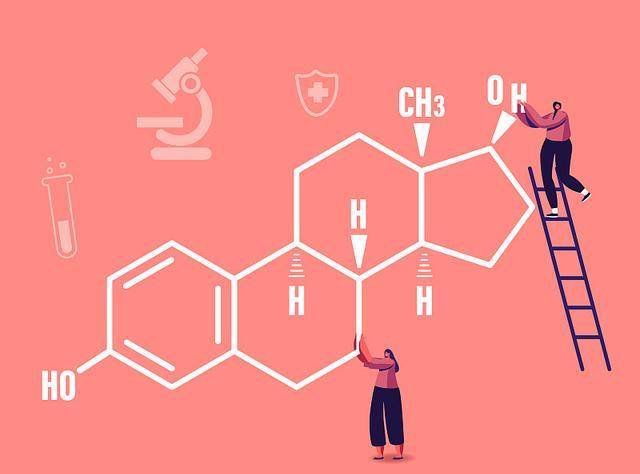Zhang Yu, a homemaker, is forty years old this year and has a lovely pair of children. She often labors for her children but can’t find time to take care of herself. Recently, she has been experiencing low mood, decreased sleep quality, reduced energy, and even symptoms of anxiety and depression. So, Zhang Yu went to see a doctor, and the doctor diagnosed her with estrogen deficiency syndrome. Zhang Yu felt worried after hearing this, not knowing how important estrogen is for women. Let’s understand together.
What is estrogen?
Estrogen is a type of hormone primarily secreted by women’s ovaries. They play an important regulatory role in women’s bodies, promoting the development and function of the female reproductive system, participating in the formation of female reproductive organs, promoting the growth and development of cells and tissues, regulating the development of the menstrual cycle, promoting the development of female-specific sexual characteristics such as breast development, and enhancing female libido and emotional development.
Estrogen is mainly divided into two types: feminine estrogen, also known as estrogen, including estradiol, estrogen, and progesterone; and masculine estrogen, also known as testosterone and androstenedione. Estrogen’s role in the body includes promoting the development of the menstrual cycle, female sexual characteristics, such as breast development, and enhancing female libido and emotional development.
Insufficient estrogen secretion in women can lead to irregular menstruation, underdeveloped breasts, decreased libido, and low mood. Excessive estrogen secretion can cause excessive menstruation, breast swelling, increased libido, and large mood swings. Therefore, the secretion of estrogen must be maintained at an appropriate level to ensure women’s physical health.
Estrogen has these 5 major functions
1. Developmental effect. Estrogen can promote the development of the female reproductive system, such as the ovaries, uterus, and fallopian tubes. It can also promote breast development, making breasts fuller.
2. Menstrual cycle effect. Estrogen can regulate the menstrual cycle. Each month when the ovaries release an egg, estrogen levels sharply rise to thicken the endometrium in preparation for fertilized egg implantation.
3. Menstrual volume effect. Estrogen can regulate menstrual volume. When estrogen levels rise, the endometrium thickens, increasing menstrual volume.
4. Libido effect. Estrogen can enhance female libido, increasing their interest in sexual activities.
5. Muscle development effect. Estrogen can promote muscle development, making the female body fuller and firmer.
Blindly supplementing estrogen is not advisable
Normal estrogen levels are very important for women’s physical health, emotional stability, and normal reproductive function development.
However, blindly supplementing estrogen is not advisable. The main reason is that estrogen levels are influenced by various factors including age, environment, nutrition, and emotions. Incorrect supplementation can easily lead to excessive or insufficient estrogen levels, which can significantly impact women’s physical health. Additionally, supplementing estrogen may lead to adverse reactions such as headaches, nausea, diarrhea, and in extreme cases, may contribute to the development of malignant tumors like breast cancer.
Therefore, if women experience symptoms of abnormal estrogen levels, they should promptly seek medical attention, undergo proper examinations, follow the doctor’s guidance, and adopt appropriate treatment measures to ensure their physical health.
How to adjust diet when women’s estrogen decreases?
First, adhere to a balanced and nutritious diet daily, consuming plenty of vegetables, fruits, and foods rich in vitamins such as legumes, eggs, mushrooms, seafood, etc. These foods supply the body with ample vitamins and other nutrients to help regulate estrogen levels.
Consume foods rich in plant estrogen such as soybeans, tofu, soy milk, bean sprouts, tofu pudding, and foods high in lecithin such as milk, eggs, and fish, which can provide abundant plant estrogen and lecithin to increase estrogen levels.
Consume foods rich in vitamin B, such as beef, pork, chicken, fish, and eggs, to provide ample vitamin B that helps promote estrogen synthesis.
Lastly, consume foods rich in vitamin E, such as nuts, soybeans, peanuts, and walnuts to provide ample vitamin E that helps inhibit estrogen breakdown.


